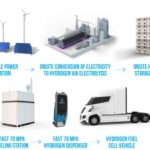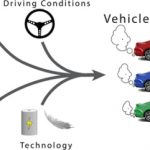Donald Trump has always backed oil and gas, and U.S. industry giants donated $7.3m to his campaign, three times more than for his 2020 run. Joe Biden has introduced green energy policies and other transition legislation, though he has also overseen an increase in domestic oil production and promised motorists he will keep petrol prices low. Both candidates know that U.S. voters are particularly sensitive to the price of their gasoline, in a land … [Read more...]
Biogas from dairy farms: what incentives can make it commercially viable?
Anaerobic digesters are used to turn cow manure into useable methane fuel. But the raw cost of that gas is ten times the market price. On the plus side, emissions are being avoided. So how do you create the incentives that are fair and make it commercially viable? In California, dairy biogas has risen from almost non-existence five years ago to delivering half of all natural gas used for transportation in the state. Aaron Smith at the Energy … [Read more...]
Green Methanol: an alternative fuel for heavy vehicles and shipping?
It’s very early days but pilot projects for green methanol are underway, explains Gabi Thesing writing for WEF. It’s a low-carbon fuel that can be produced from renewable sources such as biomass or using carbon capture. Compared to traditional fossil fuels it can reduce CO2 emissions by 60-95%, nitrogen oxide by 60-80%, and almost completely eliminate sulphur oxide and particulate matter emissions. Green methanol can be blended with traditional … [Read more...]
Engineering yeast to create Biofuels from non-food crops (straw, grass, cellulosic waste)
Using ethanol can reduce the global consumption of fossil fuels. But, commercially, ethanol in the U.S. is produced from corn and not enough is grown to make a significant impact on U.S. fuel needs. Anne Trafton at MIT describes research that has engineered yeast to break down straw and woody plant material to create ethanol as efficiently as it’s done from corn. High yields of ethanol were extracted from five different types of cellulosic … [Read more...]
Low gasoline prices create a window for tax changes to fund energy transitions
Low crude oil and gasoline prices create an opportunity for all governments to reform the way they tax or subsidise these important fuels. In general, richer importing nations have high gasoline taxes to generate substantial revenues. Poorer nations subsidise them to cut the bill for their citizens and industries. Oil producing nations do little of either. Domenico Lattanzio and Alexandre Bizeul at the IEA explain how nations that use subsidies … [Read more...]
How do we get EV payback periods down to 4 years?
The take-off of EVs will happen when the lifetime cost of ownership falls below that for a conventional car. But let’s remember that “lifetime” for a Brit means 4 years as that’s the average period of ownership. Gerard Wynn and Arjun Flora at IEEFA show how the payback period on Gerard’s Renault Zoe ZE50 has been cut by over a fifth simply by signing up to a smart meter tariff. It’s dropped from 10 to 8 years. The UK is nearing the universal roll … [Read more...]
17 GtCO2 avoided, $5tn saved: Rising U.S. car fuel efficiency since 1975
Since the 1970s, fuel-economy improvements in U.S. “light-duty” vehicles, with a contribution from rising gasoline prices, have saved 17bn tonnes of CO2, according to a new study reviewed by Josh Gabbatiss at Carbon Brief. That makes rising fuel efficiency’s impact on emissions reductions second only to that of coal-to-gas. New cars, vans and light trucks get about twice as many miles to the gallon as 1975 models. The amount of gasoline therefore … [Read more...]
Are national fossil fuel car bans compatible with EU laws, intra-trade, movement?
A growing number of EU nations are announcing laws to phase out the sale of new fossil fuel cars within the next 20 years. But are the proposed bans compatible with EU laws, or even workable given cross border trade and movement rights? If you are Dutch, why not buy your new petrol car in Belgium, then drive it back to the Netherlands? How do you enforce CO2 targets with foreign haulage fleets transiting through your nation? Eoin Bannon at … [Read more...]
Hydrogen Fuel Cell trucks can decarbonise heavy transport
Patrick Molloy at Rocky Mountain Institute runs through the pros and cons of hydrogen fuel cell vehicles (FCEVs). The big pluses are that hydrogen has an energy density of around 120 MJ/kg, almost three times more than diesel or gasoline. Half the energy generated by an internal combustion engine is wasted as heat, whereas electric drivetrains used by FCEVs only lose 10%. Nikola Motors, a U.S. maker of hydrogen trucks, claims its vehicles can get … [Read more...]
Lightweight Gasoline Cars: a necessary 30-year stop gap?
We should all be driving electric vehicles. But we have to wait for renewable electric grid capacity to support them all, charging points everywhere, and enough new batteries to be manufactured and put in all the new, affordable BEVs. And we’re running out of time. An interim solution has come from a study by MIT and Ford. David Chandler, writing for MIT, explains the study, which says that an interim solution – for certain regions - is … [Read more...]











